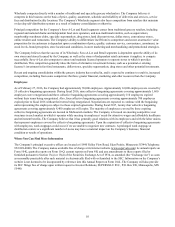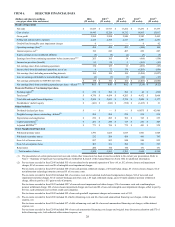Albertsons 2016 Annual Report Download - page 22
Download and view the complete annual report
Please find page 22 of the 2016 Albertsons annual report below. You can navigate through the pages in the report by either clicking on the pages listed below, or by using the keyword search tool below to find specific information within the annual report.20
Continued volatility in the prices of commodities and other supplies the Company purchases could increase or decrease the
costs of the Company’s products, and its sales and profitability could suffer as a result. Moreover, increases in the price of the
Company’s products to cover increased input costs may result in lower sales volumes, while decreases in input costs could
cause the Company to lower its prices and thereby affect its revenues or gross margins. Likewise, constraints in the supply of
key commodities may limit the Company’s ability to grow its net revenues. If the Company’s mitigation activities are not
effective, if the Company is unable to increase prices to cover increased costs or must reduce its prices, or if the Company is
limited by supply constraints, the Company’s financial condition and results of operations could be adversely affected.
The Company’s businesses are subject to laws and governmental regulations that could adversely impact the
Company’s financial condition and results of operations.
The Company’s businesses are subject to various federal, state and local laws, regulations and administrative practices. These
laws require the Company to comply with numerous provisions regulating health and sanitation standards, food safety,
marketing of natural or organically produced food, facilities, environmental, equal employment opportunity, public
accessibility, employee benefits, wages and hours worked and licensing for the sale of food, drugs and alcoholic beverages,
among others. The Company is also required to meet various security and operating standards and comply with the Controlled
Substances Act and its accompanying regulations governing the sale, marketing, packaging, holding and distribution of
controlled substances. The Company’s inability to timely obtain permits, comply with government regulations or make capital
expenditures required to maintain compliance with governmental regulations may adversely impact the Company’s business
operations and prospects for future growth and its ability to participate in federal and state healthcare programs. In addition,
changes in federal or state minimum wage and overtime laws could cause the Company to incur additional wage costs, which
could adversely affect the Company's operating margins.
The Company cannot predict the nature of future laws, regulations, interpretations or applications, nor can the Company
determine the effect that additional governmental regulations or administrative orders, when and if promulgated, or disparate
federal, state and local regulatory schemes would have on the Company’s future business. They may, however, impose
additional requirements or restrictions on the products the Company sells, require that the Company recall or discontinue sale
of certain products, make substantial changes to the Company’s facilities or operations, or otherwise result in changes to the
manner in which the Company operates its businesses. Any or all of such requirements may adversely affect the Company’s
financial condition and results of operations.
The Company’s supplier base includes domestic and foreign suppliers, and the Company has a small number of licensed stores
in foreign countries. Accordingly, political or financial instability in these foreign countries, changes in U.S. and foreign
relationships, laws and regulations affecting the importation and taxation of goods, including duties, tariffs and quotas, or
changes in the enforcement of those laws and regulations could adversely impact the Company’s financial condition and results
of operations. In addition, the Company is required to comply with laws and regulations governing ethical, anti-bribery and
similar business practices. In our foreign operations, the Company is subject to the risk that one or more of its employees,
contractors or agents could engage in business practices prohibited by U.S. laws and regulations that are applicable to the
Company, such as the Foreign Corrupt Practices Act, including those based in or from countries where practices that violate
U.S. laws and regulations or the laws and regulations of other countries may be customary, or will engage in business practices
that are prohibited by the Company’s policies or circumvent its compliance programs. Any of these violations could adversely
affect the Company’s business, financial condition and operating results. The Company may choose to pursue further
expansion into international markets. If the Company seeks and attains a larger international footprint, it would be required to
comply with additional foreign laws and regulations. Any failure to comply with these laws or regulations could result in civil
and/or criminal sanctions and could adversely affect the Company’s financial condition and results of operations. Further,
foreign currency exchange rates and fluctuations may have an effect on our future costs or on future cash flows from our
foreign operations, and could adversely affect our financial condition and operating results.
The Company may face significant costs for compliance with existing or changing environmental, health, food safety
and safety requirements and for potential environmental obligations relating to current or discontinued operations.
The Company’s operations are subject to extensive and increasingly stringent federal, state, local and foreign laws and
regulations pertaining to the protection of the environment, including those relating to the discharge of materials into the
environment, the disposal of food by-products, the handling, treatment and disposal of wastes and remediation of soil and
groundwater contamination. Failure to comply with these requirements could have serious consequences for the Company,
including criminal, as well as civil and administrative penalties, claims for property damage, personal injury and damage to
natural resources and negative publicity. Compliance with existing or changing environmental requirements, including more
stringent limitations imposed or expected to be imposed in recently renewed or soon-to-be renewed environmental permits,
may require capital expenditures.
























